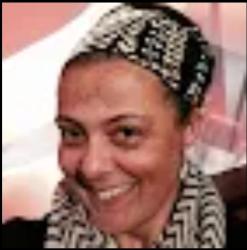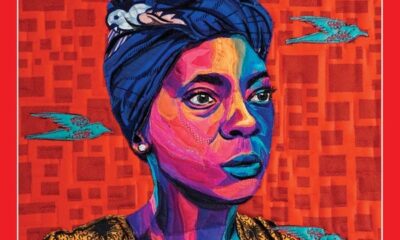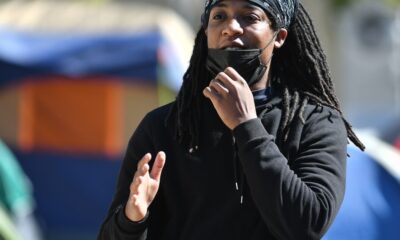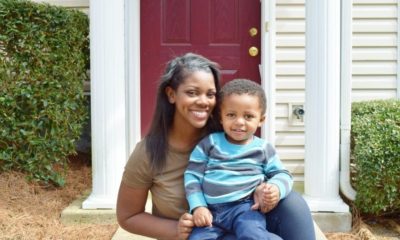Featured
Big Freedom Dreams: Aisia Jones Challenges The Status Quo in Cleveland

Activism is alive and well around the United States. In the Midwest, movements like Black Lives Matter continue to serve as the collective conscience of a region that grapples with violence against African Americans, as well as inequity across a range of social and economic indicators. The “Big Freedom Dreams” series profiles Midwestern Black activists making their mark.
When Ferguson, Missouri burst into the public consciousness in 2014, many Americans – from the news media to the average citizen – scratched their heads: Protests in the Midwest? Unrest in the usually placid heartland?
Not only did people from the community near St. Louis rise up in the wake of the killing of Michael Brown by a white police officer, they have kept up the drumbeat for justice, inspiring others around the country to join in. Many are now building on that drumbeat with roles that will have ripple effects across society for years to come.
To observers, near and far, one historian who studies African American activism in the Midwest said no one should be surprised that racial and social justice movements are alive and well in the region.
“Once we understand that this has always been a challenging place for working people, for women, for people of color, we recognize that the protests against the conditions in the Midwest didn’t start in 2020 with George Floyd’s murder in Minneapolis, or in 2014 with Mike Brown’s killing in Ferguson,” said Ashley Howard, a history professor at the University of Iowa.
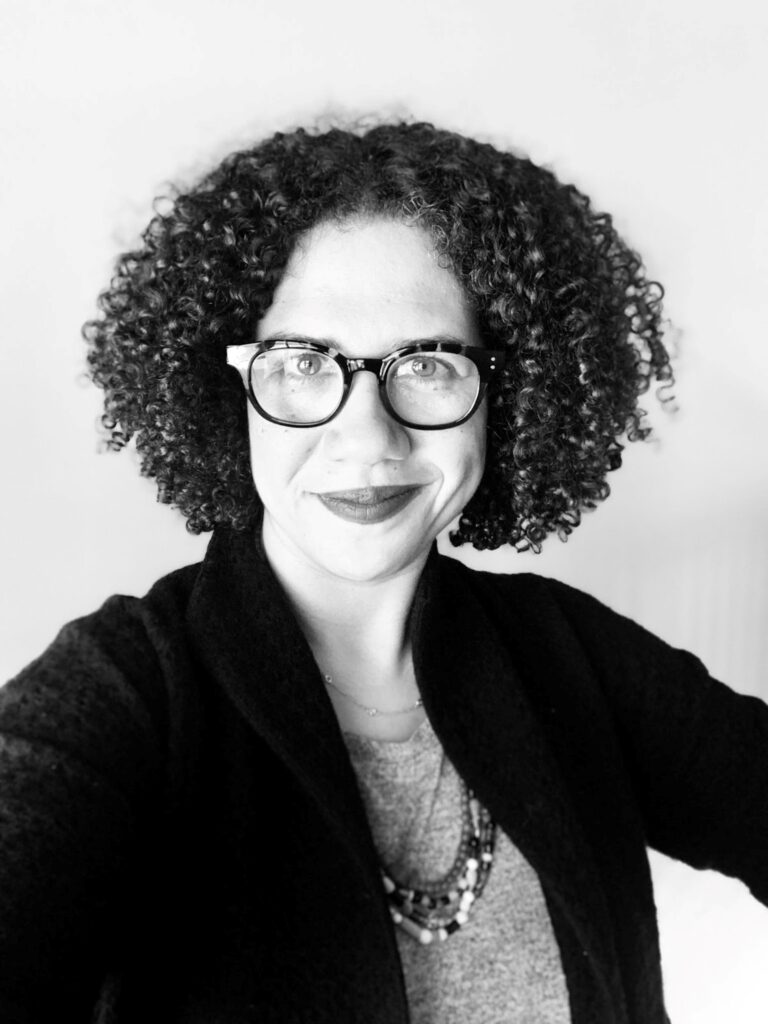
and researches African American history in the Midwest. Credit: Holly Edgell
Howard said popular perceptions of the Midwest as the nation’s “good guy” compared to the Deep South essentially whitewash the truth.
- READ: Ashley Howard’s Washington Post contribution, “The Midwest has always been a site of Black political activism”
“Non-Midwesterners may have a hard time reconciling the shortcomings of our region,” she said. “Because they’re comparing it to another place. And therefore any challenges to that oppression, to that inequity can be written off as, ‘Well, you all are just complaining, it could be much worse. Everything’s fine for you.’”
But, of course, everything is not fine when it comes to life for African Americans in the Midwest. Each name of a Black person who has fallen at the hands of the police is testament to this fact. And then there are truths that people in other parts of the country may not see: continuing inequities in housing, healthcare, education, and employment – not to mention racial profiling and efforts to reshape electoral maps to the detriment of Black voters.
For at least a few generations, protests and civil action were beside the point for many in the Midwest, as African Americans migrating from the Deep South found relatively better lives in cities like St. Louis, Chicago, Detroit and Indianapolis.
“They’re like, ‘You know what? This isn’t great, but it is so much better than where I came from. I’m just going to keep my head down, and I’m going to work. I’m doing my thing,’” Howard said.
Doing her thing
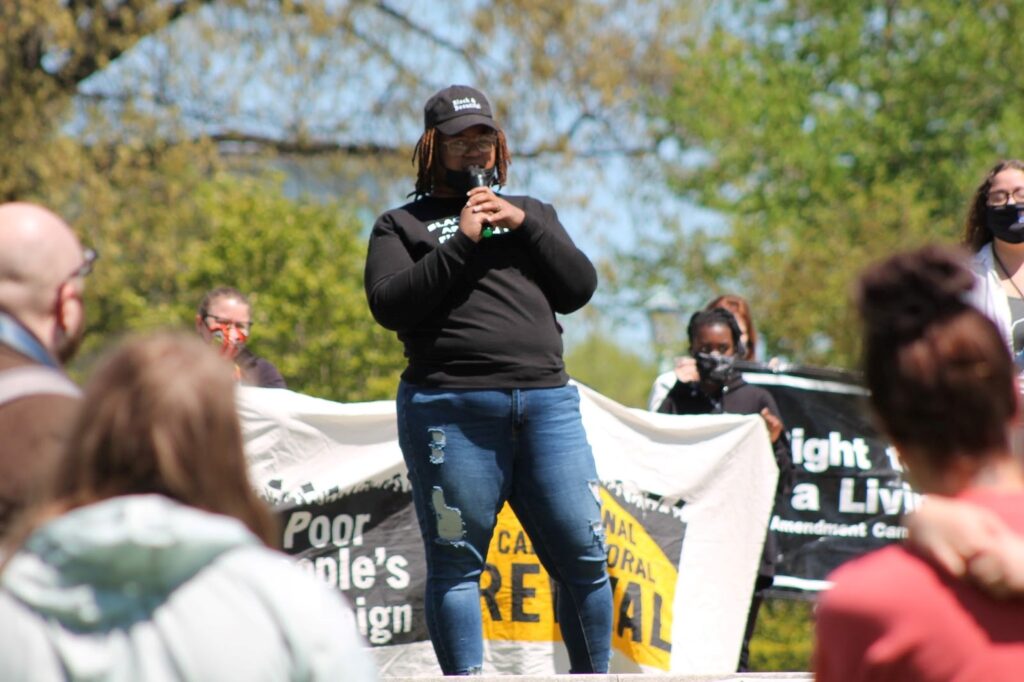
Photo courtesy of Aisia Jones.
When Aisia Jones announced she would run for Cleveland City Council in 2021, she and her supporters knew her candidacy was a long shot. A young Black woman with no electoral experience, Jones was facing an incumbent who had represented her northeast Cleveland community since 1978. Mike Polensek, who is white, was the longest-serving city council member in Cleveland history.
Ward 8 is about 70% Black. Still, with decades of building relationships with constituents and a “can-do” reputation, Polensek, 71, retained his seat in the Nov. 2021 race.
Jones, 31, was disappointed with the election outcome, but found the experience a worthwhile extension of her work as an activist and found gratification in her campaign’s focus on community revitalization, public safety and other issues.
“I ran on transparency, on the fact that I’ve been an activist for the last eight years. As a wife, as a mother. As a person still doing this work and as a nonprofit professional,” Jones said.
Talking with residents on the campaign trail, Jones said conditions and disparities in her community hit home anew.
“Just entering my own community and learning even deeper about inequality in practices that have been going on around me and within the community, it was definitely a learning experience for me and just showed me how much more work needs to be done,” she said.
Today, Jones can’t help but wonder if more than 40 years with the same city council representative had numbed many Ward 8 voters to the possibility of change. After all, she said, Polensek was in his seat when neighborhoods in his ward were still off-limits to African Americans.
“And a lot of people have not been engaged in politics, because for so long, we believed that the system is not designed for us,” Jones said. “But we must be a part of it to redesign it, and that is one of the things that urged me and encouraged me to run.”
Ward 8 is home to about 21,000 people. According to data for the Center for Community Solutions, a nonpartisan think tank focused on health, social and economic issues, the median household income in the neighborhood is $26,000 – about $4,000 less than for the city of Cleveland as a whole. In addition, about 30% of the population live in poverty. The share of children living in poverty is more than 40%.
Statistics like these, Jones said, demonstrate that she has a role to play.
“We, as activists and as community organizers, can make change by taking our activism and our organizing to the next level,” Jones said. “I don’t call myself a politician. I call myself a change agent, because that is what I am truly doing and I’m committed to the decision.”
Jones’ awakening as a change agent started in a very personal place. She was about to become a mother for the first time when Trayvon Martin was killed in 2012.
“That really shook me. I was on my way to giving birth to a little black boy,” she said. “I started to go to community gatherings where people shared how we felt. You know, I was not too far from being a child myself – in my early 20s – so I was like, ‘I have to do something.’”
Jones’ son was a toddler when a white Cleveland police officer shot and killed Tamir Rice, only 12 years old, in 2014.
“It shook my very being,” she said. “It was everything I was afraid of as a mother.”
Jones began to take leadership roles in the Cleveland Black Lives Matter movement. She got involved with the Cleveland branch of New Era, a national organization that promotes safety and investment in Black communities.
Then came another blow: The killing of George Floyd by Minneapolis police in 2020.
“Nothing could stop me from being out in the streets, being out in the community,” she said. “People were angry, so we had to take it to the streets, we had to talk, we had to scream, yell and cry, as we saw George Floyd be murdered right on the TV screen.”
Jones has not ruled out running for office again in Cleveland, which ranks as the second poorest U.S. city (after Detroit).
“Unless we grasp hold of the political power that we have within our cities and our counties we won’t really see change,” she said.
To learn more about African American activism in the Midwest, visit AfricanAmericanMidwest.com
Holly Edgell is a journalist living in St. Louis, Missouri. Follow her on Twitter @hollyedgell.

-

 Featured10 months ago
Featured10 months agoCalifornia Is the First State to Create A Public Alert for Missing Black Youth
-

 Featured10 months ago
Featured10 months agoAfrican American Leaders Stay the Course Amid Calls for President Biden To Bow Out of Race
-

 Featured10 months ago
Featured10 months agoThe Debate Fallout Lands on Both Candidates
-

 Featured9 months ago
Featured9 months agoPresident Joe Biden Decides to Withdraw from the Presidential Race
-

 Featured9 months ago
Featured9 months agoIn One of His Final Speeches as President, Biden Says It’s Time for ‘Fresh Voices’
-

 Featured9 months ago
Featured9 months agoPresident Joe Biden Describes Shooting of Donald Trump As ‘Sick’

